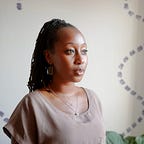Dear White Anarchists & Anti-Capitalists & Anti-Racists: where are the people of color in your movements & networks?
These days being slightly aware, ‘woke,’ anti, or whatever only requires having a small analysis of inequality in the world. While any critical perspectives about our world are important, if the way one moves in the world still reinforces such inequitable and exclusionary structures then the theory does not hold in practice. Often, even the best of us, let myths about certain racial and ethnic groups justify our lack of action regarding true inclusivity, an acceptance and understanding of otherness.
This article by Benji Hart debunks a myth that Black people are more homophobic than others. Some White queer communities have used this misconception (along with notions about countries in Africa and Jamaica — who are exceptionally violent to their LGBTQ communities) to exclude and even erase Black people and Africans from the LGBTQ movement globally. But realizing the importance of articulating the experiences and realities of others also means challenging preconceived and exaggerated notions about what type of people are down for what causes. Now let’s be clear, if in an anti-capitalist world there is still racism and homophobia, then either it is not truly anti-capitalist or I do not want it.
I often see networks and organizations who claim to be anti-capitalist, anti-racist, etc. filled with White men and women with maybe a speckle of brown here or there — if even a speckle. Claims about “not knowing where Black nonconformists are” or saying we have “other different things to worry about” are used as justifications for this lack of diversity. This type of reasoning perpetuates a racist and exclusionary system that intends to erase narratives of people of color that do not fit traditional stereotypes, thus justifying violence and intolerance towards us. Some industries, such as the art world, romanticize and glorify artists of color who do not fit their limited notions of people of color — in a way to imply that this person is a unicorn and there are no other alternative people of color like them. Best known for this is Basquiat, who was largely exploited by the White contemporary art world, but also artists like DJ Martinez, who himself believed he was not like other Latinx until he met Harry Gamboa, other Chicano artists like himself, and joined ASCO. Regardless, movements like AfroPunk and organizations like Pharrell William’s (i am) OTHER have shown us that people of color being alternative and eccentric is not at all rare. We are not a monolith and have never been.
Likewise, from W. E. B. Du Bois to Thomas Sankara to Cedric J. Robinson’s Black Marxism and Manning Marable’s How Capitalism Underdeveloped Black America to the articles of young Black/African women writers like Paula Akugizibwe, Shanna Collins, Eliza Anyangwe and Mia Charlene White articulating an alternative view of the world that does not support capitalism — to whole countries in Latin America & the Caribbean. Being anti-capitalist, and even anarchist (and definitely anti-racist), is not new for Black and Brown people. In several cases people of color have been at the forefront of these movements. It is true that for a variety of historical reasons and contemporary realities (such as colonialism and post-colonialism) it is not common for Black and Brown people to have anti-capitalism as their forefront issue. However, many of us who are profoundly working to end racism and inequity know that capitalism must fall with all those other negative isms. Hence, why the Fees Must Fall movement in South Africa was initiated by and still lead by Black South Africans. The systems thrive and feed off each other: racism and capitalism.
We are here. We have always been. In order to create a different future, we must challenge each other (especially our cis-men and White accomplices) to open up their/our eyes to the alternative, subaltern realities that already exist. World Unwrapped is about highlighting other urban narratives, because we know that other just means there are more unicorns in the world than we know about. We are not hiding, we just need platforms, networks, communities, and to be seen the way we see ourselves. If we are going to change the world, we need to change our perspective and debunk collective myths. If we can’t see a different future, then we will surely fail at creating one. So let’s aim to see differently and uplift the difference that already exists… the solutions have been brewing, we just have to support them. And as Fidel says, as for the rest “history will absolve us.”
